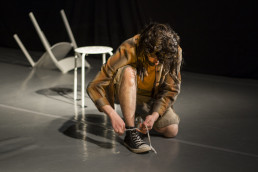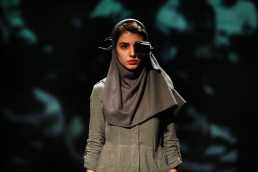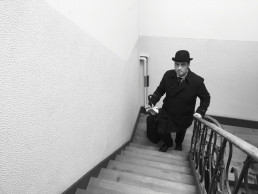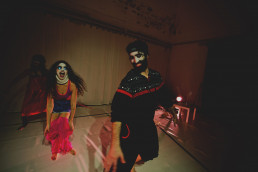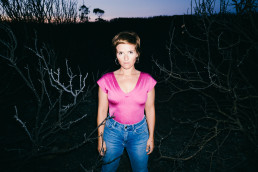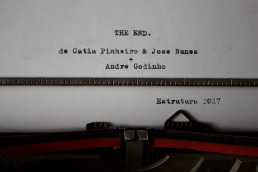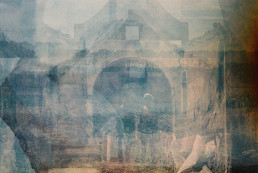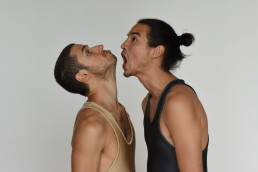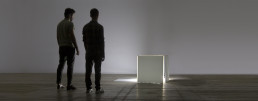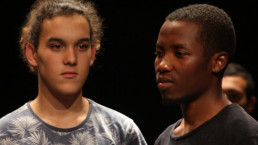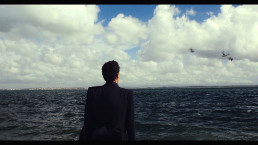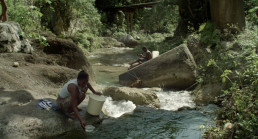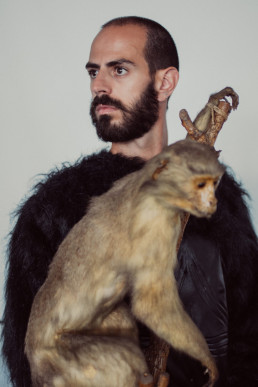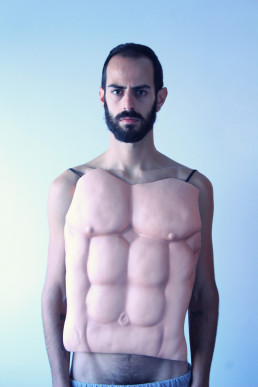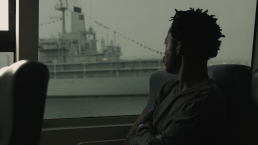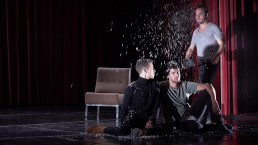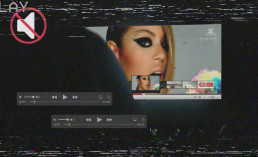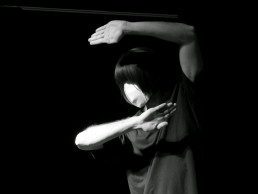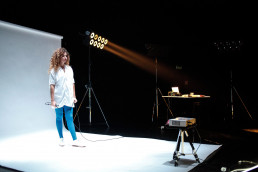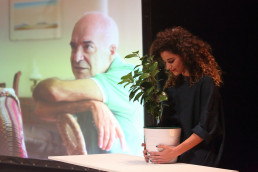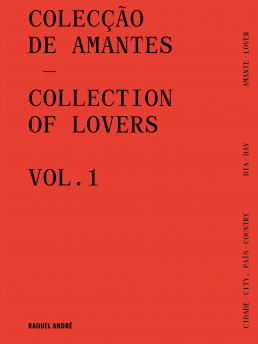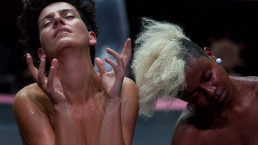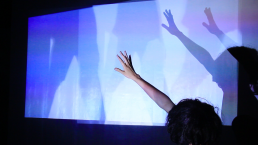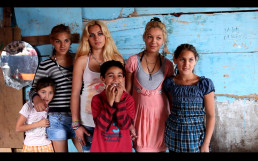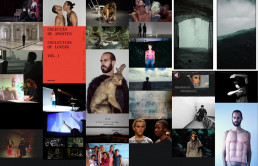“KASPAR: PALAVRA SOPRADA | INTERVALO”
KASPAR: PALAVRA SOPRADA
Espetáculo no lugar do ponto de teatro. Assistirá a uma encenação da peça Kaspar (1967), de Peter Handke, numa situação próxima à daquele elemento da equipa que, com o texto anotado, acompanha o ator, pronto para lhe valer no calvário de uma branca recorrente ou de uma aflição inesperada. Como por vezes sucede a estes artistas invisíveis, estará sozinho num camarim ou noutra sala dos bastidores, seguindo o curso do espetáculo através da munição de som do palco e de uma câmara de vídeo, junto ao microfone que lhe permitirá levar a deixa ao ouvido do ator em cena. Tratando com liberdade a história verídica da criança selvagem Kaspar Hauser, Handke dá-nos a ver e ouvir o processo de chegada à casa da linguagem. Neste trânsito Kaspar perde a única frase que sabe dizer – “Gostava de ser como alguém que já em tempos existiu” – para chegar a uma situação inteiramente nova marcada por uma longa intervenção que começa com: “Sou saudável e forte.” Na segunda parte da peça, que não integra o espetáculo, assiste-se a um novo movimento, no qual a dissolução identitária da personagem conduz à frase com que o texto termina: “Eu: sou: apenas: cabras e macacos”. Acompanhando Kaspar, seguimos um percurso como ele poderá acontecer quando o desejo de integração encontra nas vozes do mundo o apelo à conformidade, seguimos esse caminho como testemunhas silenciosas ou, talvez, soprando a palavra esperada.
INTERVALO
Em Intervalo, o artista João Ferro Martins responde às indicações que Peter Handke dá em Kaspar para o ambiente sonoro do intervalo da peça, propondo uma instalação que dialoga com o interior do edifício teatral e com o espetáculo de auto-teatro. O criador utiliza dos textos do Intervalo apenas as didascálias escritas por Handke para o profissional de som, ditas num registo sussurrado análogo ao dos pontos de teatro; a única exceção é uma sequência de falas sugeridas por Handke em que uma voz, aqui de uma mulher, ensina como se deve comportar à mesa. Estas opções despoletaram a criação de uma imagética ambiente, de texturas e de um universo melódico que cumprem um desejo de João Ferro Martins de elaborar um tema musical dedicado ao personagem atormentado desta peça.
Ficha técnica
KASPAR: PALAVRA SOPRADA (AUTO-TEATRO)
Direção Alexandre Pieroni Calado
Texto Peter Handke
Tradução Anabela Mendes
Interpretação Gustavo Salinas Vargas, Paula Garcia, Tiago Mateus
Vídeo João Seiça
Som Gonçalo Alegria
Desenvolvimento tecnologias interativas Artica CC
Assistente vídeo Ana Sofia Sousa
Produção executiva e Comunicação Andreia Páscoa
Desenho gráfico e de Comunicação Miguel Pacheco Gomes
Duração 50 minutos
INTERVALO (INSTALAÇÃO SONORA)
Criação João Ferro Martins
Voz e Violoncelo Joana Guerra
Voz Alexandre Pieroni Calado
Loop de 18 minutos
Apoio financeiro Direção-Geral das Artes, Governo de Portugal, Câmara Municipal de Almada, Embaixada da Áustria (Lisboa)
Financiamento da edição Teatro Nacional D. Maria II
“KASPAR: PALAVRA SOPRADA | INTERVALO”
KASPAR: PALAVRA SOPRADA
A show taking place on the theatre’s prompt side. You will see a performance of Peter Handke’s play, Kaspar (1967), in a situation similar to the prompter who accompanies the actor, with the written text, ready to help him in the calvary of a recurring memory loss or unexpected affliction. Sometimes it is the case of these invisible artists, they will be alone in a dressing room or another one backstage, following the course of the show through the sound coming from the stage and a video camera, next to the microphone that will allow them to cue the actor on stage. Freely transforming the true story of the wild child Kaspar Hauser, Handke allows us to see and hear the process of arriving at the language domain. In this transit Kaspar forgets the only line he can say – “I would like to be as someone who once lived” – to achieve an entirely new situation marked by a long intervention that begins with: “I am healthy and strong.” In the play’s second term, which is not part of the show, there is a new movement in which the identity dissolution of the character leads to the ending phrase of the text: “I: I am: only: goats and monkeys.” Accompanying Kaspar, we follow a path as it can happen when the desire for integration finds in the voices of the world the call to conformity, we follow this path as silent witnesses or perhaps, blowing the expected word.
INTERVALO
In Intervalo, the artist João Ferro Martins responds to the instructions that Peter Handke gives in Kaspar for the sound space of the show’s break, proposing an installation that dialogues with the interior of the theatrical building and with the show of self-theater. The creator only uses the script notes from texts of Intervalo written by Handke to the sound expert, said in a whispered register analogous to the one of the prompter; the only exception is a sequence of lines suggested by Handke in which a woman’s voice teaches how to behave at the table. These options triggered the creation of an imagistic environment, of textures and a melodic universe that fulfill a desire of João Ferro Martins to elaborate a musical theme dedicated to the tormented character of this play.
Credits
KASPAR: PALAVRA SOPRADA (AUTO-THEATRE)
Direction Alexandre Pieroni Calado
Text Peter Handke
Translation Anabela Mendes
Interpreters Gustavo Salinas Vargas, Paula Garcia, Tiago Mateus
Video João Seiça
Sound Gonçalo Alegria
Interactive technologies development Artica CC
Video assistant Ana Sofia Sousa
Executive production and Communication Andreia Páscoa
Graphic and Communication design Miguel Pacheco Gomes
Length 50 minutes
INTERVALO (SOUND INSTALLATION)
Concept João Ferro Martins
Voice and Cello Joana Guerra
Voice Alexandre Pieroni Calado
18 minutes loop
Financial support Direção-Geral das Artes, Governo de Portugal, Câmara Municipal de Almada, Embaixada da Áustria (Lisbon)
Financial support for editing Teatro Nacional D. Maria II
